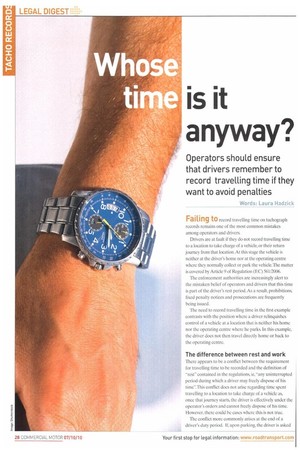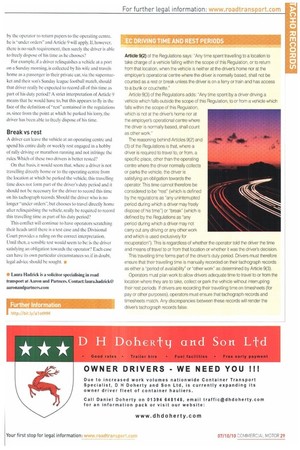is it anyway?
Page 28

Page 29

If you've noticed an error in this article please click here to report it so we can fix it.
Operators should ensure that drivers remember to record travelling time if they want to avoid penalties
Words: Laura Hadzick Failing to — record travelling time on tachograph records remains one of the most common mistakes among operators and drivers.
Drivers are at fault if they do not record travelling time to a location to take charge of a vehicle, or their return journey from that location. At this stage the vehicle is neither at the driver's home nor at the operating centre where they normally collect or park the vehicle. The matter is covered by Article 9 of Regulation (EC) 561/2006.
The enforcement authorities are increasingly alert to the mistaken belief of operators and drivers that this time is part of the driver's rest period. As a result, prohibitions, fixed penalty notices and prosecutions are frequently being issued.
The need to record travelling time in the first example contrasts with the position where a driver relinquishes control of a vehicle at a location that is neither his home nor the operating centre where he parks In this example, the driver does not then travel directly home or back to the operating centre.
The difference between rest and work
There appears to be a conflict between the requirement for travelling time to be recorded and the definition of -rest" contained in the regulations. ie, "any uninterrupted period during which a driver may freely dispose of his time-. This conflict does not arise regarding time spent travelling to a location to take charge of a vehicle as, once that journey starts, the driver is effectively under the operator's orders and cannot freely dispose of his time. However, there could be cases where this is not true.
The conflict more commonly arises at the end of a driver's duty period. If, upon parking, the driver is asked by the operator to return papers to the operating centre, he is -under orders" and Article 9 will apply. If, however, there is no such requirement, then surely the driver is able to freely dispose of his time as he chooses?
For example, if a driver relinquishes a vehicle at a port on a Sunday morning, is collected by his wife and travels home as a passenger in their private car, via the supermarket and their son's Sunday league football match, should that driver really be expected to record all of this time as part of his duty period? A strict interpretation of Article 9 means that he would have to, but this appears to fly in the face of the definition of -rest" contained in the regulations as, since from the point at which he parked his lorry, the driver has been able to freely dispose of his time.
Break vs rest
A driver can leave the vehicle at an operating centre and spend his entire daily or weekly rest engaged in a hobby of rally driving or marathon running and not infringe the rules. Which of these two drivers is better rested?




























































































































